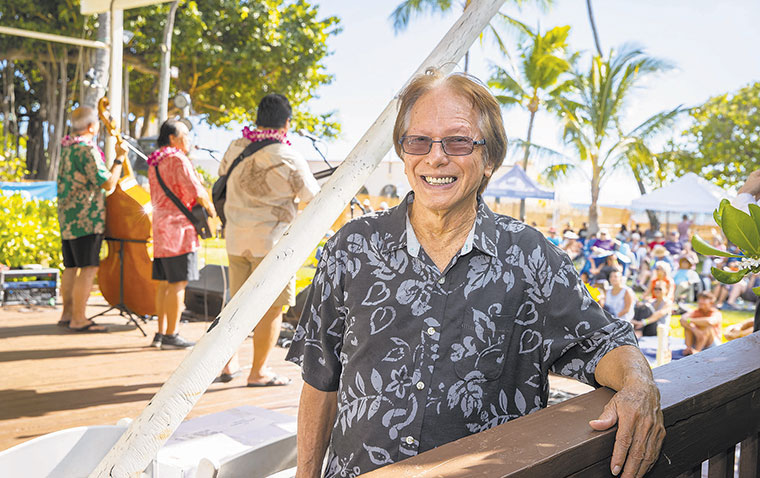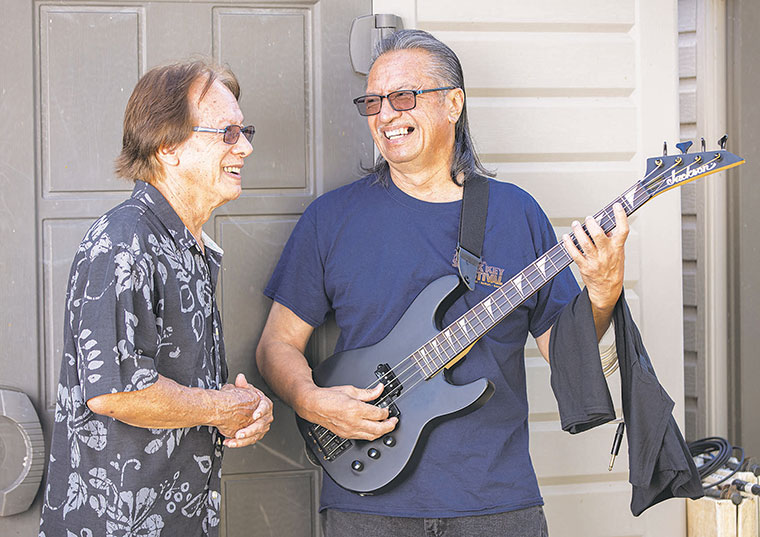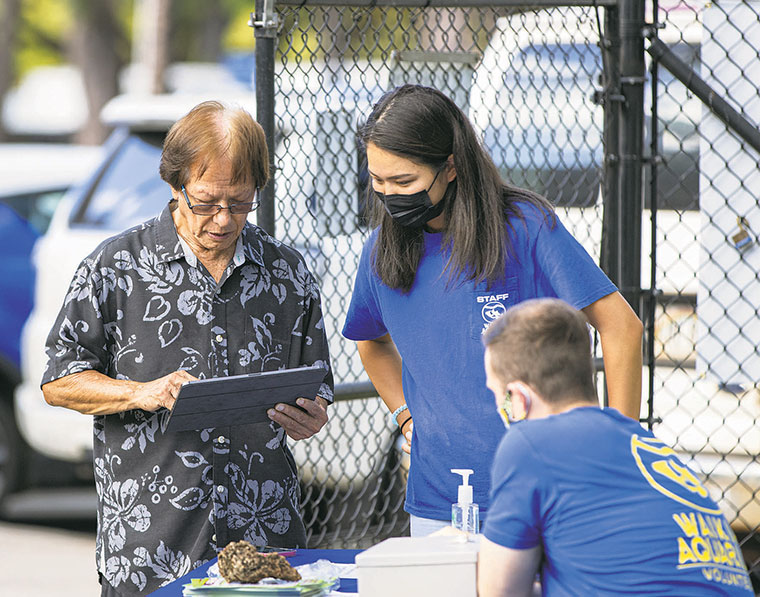By John Berger
In 1982, Milton Lau organized a slack-key concert — the first of dozens, as it turns out, on various islands and the mainland — to pay homage to his friend, Gabby Pahinui
Ask Milton Lau what keeps him young at heart, and the longtime Windward Oahu resident is quick to answer.
“The two things that really keep me going, and keep my mind thinking young, are all my grandkids and music,” said Lau, 78. “Without those two, I would probably wither away and die.”

ERIK KABIK / SPECIAL TO THE STAR-ADVERTISER
Milton Lau has been promoting and producing the annual Hawaiian Slack Key Guitar Festival for 40 years. This year’s festival on Oahu Aug. 13 featured 14 artists who played at the Waikiki Aquarium, where Lau enjoyed the fruits of his labor backstage.
Several of his 15 grandchildren were on the production crew last month when Lau and the Ki-ho‘alu Foundation presented the 40th anniversary — Waikiki style — Hawaiian Slack Key Guitar Festival 2022 on the lawn at the Waikiki Aquarium. Also on hand to help was his wife, Anne, and his son Chris, who played bass for several of the slack-key artists during the five-hour event.
In fact, the festival was quite the family affair. Nearly all of the dozen production staffers were relatives.
Lau has produced the festival ever since he presented the first one as a tribute to slack-key master Gabby Pahinui in 1982.
To this day he works to secure the venues, handles publicity, arranges the stages and sound equipment, schedules entertainers, and books transportation when necessary.
Lau’s work supporting the slack-key genre intensified in the early 1990s when he began presenting festivals outside Oahu — first on Maui, Kauai and the Big Island, and then on the mainland.
The 14 artists Lau gathered at the aquarium in August ran the gamut from Ledward Kaapana, unquestionably one of the great slack-key guitarists of his generation, to Jonah Domingo and Ian O’Sullivan, a generation or two younger but on their way up. Paul Togioki represented the slack-key traditions of Kauai. Pat Landeza came from California to play.

PHOTO BY ERIK KABIK / SPECIAL TO THE STAR-ADVERTISER
O’Sullivan, director of guitar and ukulele at Kamehameha Schools, called the festival a great platform.
“For what I do as a finger style, classical slack-key guitarist, there really couldn’t be a better platform for me to be sharing my music. Any tradition needs innovation constantly, right? I mean, going back to why we even have slack key, right, was these genius cowboy paniolo left with some guitars, and they had to figure out what to do with it. Milton is very supportive of what I want to play.”
Looking back 40 years, Lau had no idea that he was starting a Hawaii tradition.
“Nobody knew (it would last this long), but I think primarily for me it was a combination of passion that I had for this music and my relationship with Gabby,” he said.
As a young musician, he was invited to sit in with the Pahinui ohana in Waimanalo and became friends with Pahinui and his sons. “The art form is one of the oldest forms of music in Hawaii, which predates ukulele, of course,” he said. (Mexican cowboys brought guitars
to Hawaii in the 1830s. The Portuguese forerunner of the ukulele arrived in 1879.)
Lau was born in Honolulu and grew up on the windward side of Oahu. He graduated from Farrington High School then set off to Kansas State University, intent on becoming a teacher.
But when he came home with his college diploma, he decided teaching was not for him. His mother suggested he apply for a job with the City & County of Honolulu, and he was hired by the Department of Parks and Recreation. When he began presenting city music events for the department, Lau got to know the movers and shakers of the local music scene. That meant he already had solid experience when he organized the first slack-key festival for the city.

PHOTO BY ERIK KABIK / SPECIAL TO THE STAR-ADVERTISER
Putting on annual slack-key festivals on Oahu, Maui, Kauai, the Big Island and the mainland takes many hands. Lau himself secures venues and schedules the talent, among other things. At the Oahu festival, he goes over a few details with staffers, and at top, takes a moment to chat with performer Kata Maduli.
Today, Chris Lau shares his father’s passion for music and producing records. Their record label, Rhythm & Roots, had five albums on the final ballot during the seven years the Grammys had a separate award category for Hawaiian music. Father and son won Na Hoku Hanohano Awards in 2009 for their work as co-producers of the compilation album “Hawaiian Slack Key Kings Master Series Vol. II.”
“Chris has always worked with me,” Lau said. “He’s definitely following my footsteps, and I expect him to take over the festivals once I’m fully retired.”
But, he added, that won’t be for the foreseeable future.
“I can’t just walk away from it,” he said. “It’s hard to let go something that you enjoy. … I think it gives you a bit of longevity. Being around people that you love doing things that you enjoy. We all enjoy the same music, and working with a lot of younger, younger guys is really part of the answer to keep yourself young and vibrant.”
See More News